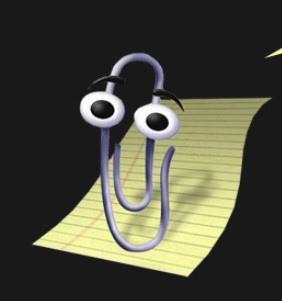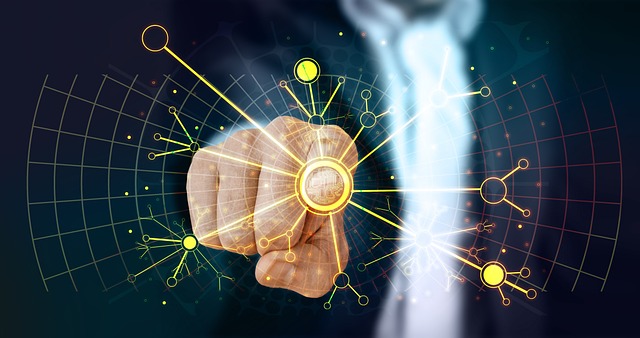These days, everyone seems to be either excited about Artificial Intelligence or worried about it, and some of us are both. So, I wanted to see if I could clear up a few things about this thing that most folks just call “AI.”
AI is really nothing new. It has been developing in your lives for many years.
 In 1997 the IBM supercomputer, Deep Blue, beat world chess champion Garry Kasparov, and for perhaps the first time AI was taken seriously. Also in 1997, Microsoft introduced Clippy, the intelligent user interface for Microsoft Word and Excel. You could click on Clippy and instructions for your current task would appear. Clippy was another example of AI.
In 1997 the IBM supercomputer, Deep Blue, beat world chess champion Garry Kasparov, and for perhaps the first time AI was taken seriously. Also in 1997, Microsoft introduced Clippy, the intelligent user interface for Microsoft Word and Excel. You could click on Clippy and instructions for your current task would appear. Clippy was another example of AI.
These days, Netflix suggestion algorithms, email autofill, and spell-check services are taken as givens in our lives. Spam filters are must-haves. These are examples of AI in action and yet no one worries about them or their power to disrupt our lives. We see them as conveniences, perhaps even necessities once we have gotten used to them.
What changed this year was the introduction of ChatGPT, the user-friendly AI interface incorporated into Microsoft’s Bing search engine. ChatGPT changed the use of AI like graphical interfaces changed the use of computers. Until 30 years ago, using a computer required understanding some nerdy programing language to enter DOS commands. Now you just see a picture on the screen and point at it with finger or mouse and “voila!” – the process represented by that picture begins. This is called a graphical interface.
ChatGPT is similarly easy-to-use and has resulted in the fastest adoption of technology by consumers in human history. Over 200 million users tried ChatGPT within the first month it was available. Here is how it works.
ChatGPT and other AI systems are known as Large Language Models or LLMs. After reading and storing most of the publicly accessible Internet (about 4 billion pages of content), LLMs work by responding to a prompt or beginning piece of text, adding one word at a time. The sequence of words it produces is the result of a ranking of how many times one word follows another in all its memorized data. It is a very simple concept, expanded with immense amounts of data.
In one sense, ChatGPT operates by brute force. It has read and remembered more words than any human can, and it can analyze what words most often go together. But how does it get from there to writing long essays that make sense? Not even the experts are sure, and this spooks people. The results are occasionally bizarre, amusing, or even just plain wrong. Fact-checking isn’t part of these systems yet. But it will be, and that will enable them to do certain things far better than humans can. Right now, Large Language Models are still in their infancy. The bugs in the system will be dealt with, and probably quickly.
AI does have the potential to take over many jobs that are repetitious or overly detailed for most of us. Tasks like accounting, administration, teaching, legal research, code writing, graphic design, and diagnostics are the kinds of jobs that could be most at risk of being taken over by AI.
Where AI collides with reality in disturbing ways is in its creative realms. Plagiarism is a big problem. Since AI generators have scooped up just about all the knowledge on the Internet, much has been stolen from those who created it. How to keep content separate and make users pay for if it was not intended to be used for free is a big issue to creators of content. I anticipate this will be a legal or regulatory tug-of-war for many years.
Should we fear AI? Some people do. Certainly, some jobs will become automated, perhaps quickly. The Industrial Revolution had similar effects, making 100 million farmers and craftsmen unnecessary and motivating them to move from farms into cities. This took 3 or 4 generations to unfold as people adapted. Electrification and computerization changed the world, but it took many decades for the technology to spread. Again, people adapted.
With the adoption of AI, we may not have the luxury of those long time frames. I expect it to be somewhat chaotic, happening quickly by historical standards. Today’s versions of Luddites will be screaming for the government to stop the process and protect them from whatever it is that they fear about AI. But, in my opinion, it is too late for regulations to put this genie back in the bottle. As I mentioned, we have all welcomed AI into our lives in many ways, already.
Will AI threaten humankind? I don’t think so. As good as AI is, remember: we can fly, but not like birds. And we can swim, but not like fish. So, I believe that AI eventually will be able to think, but not like humans.
But, how will AI affect Shadowridge, you and your money?
In March, SEC Chair Gary Gensler worried publicly that a future financial crisis could be sparked, “because everything is relying on one base level, what’s called the generative AI level, and a bunch of financial technology applications are built on top of it.”
Gensler’s comment reminds me of the old story of a herd of lemmings all running off a cliff together. If most financial technologies are built upon a single base data set, as Gensler was warning, then investors using those services may end up like the lemmings, all doing the same things at the same time. As market history has shown us, when investors all do the same thing at the same time, very few make money and most lose money.
At Shadowridge, we prefer the old-fashioned kind of intelligence, the introspective and reflective kind. Sure, we use computers to make us more efficient, but ultimately our buy/sell decisions are made by us humans because we are always watching for things that have never happened before. I have my doubts about how a computer that studies history can foresee events that have never happened before, like the Covid crash or the Financial Crisis of 2008 or terrorists flying planes into the World Trade Center. During each of those events, our proactive style of investment management was able to Adapt to Changing Markets® and prove itself superior to mindlessly following academic theories.
No one knows exactly what is going to happen in the future, including AI. As portfolio managers, we remain confident in our ability to recognize changes affecting the markets and then react to them appropriately. And we often do this before you hear about it in the news or the lemmings head for the cliff. This is what makes what we do at Shadowridge so valuable.


